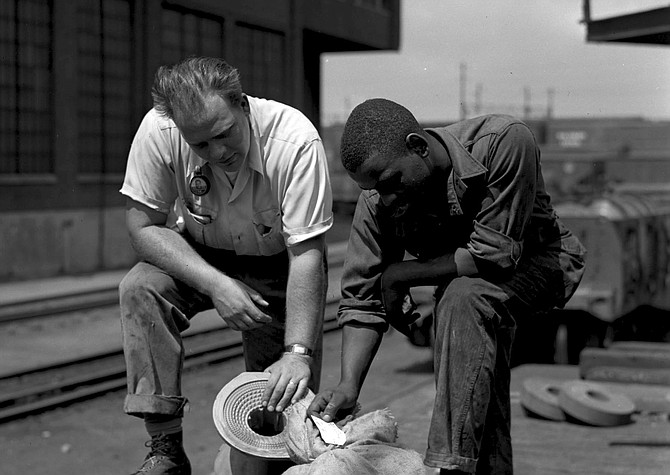Black families in America have never reached the levels of wealth that American whites enjoy, a new report from Brandeis University finds.
Black families in America have never reached the levels of wealth that American whites enjoy, a new report from Brandeis University finds. African Americans started at a distinct disadvantage, and the equality gap grows wider every year.
A 25-year research study at Brandeis' Institute on Assets and Social Policy in Massachusetts followed 1,700 working-class households selected at random from a nationwide sample. The data, released in a report last week, shows that from 1984 through 2009, the wealth gap between black and white families tripled. In inflation-adjusted dollars, the gap went from $84,000 at the beginning of the study to $236,500 at the end. The report defines wealth as net worth (what you own minus what you owe), education, income levels and employment.
Moreover, while the median net worth for whites in the study grew from $90,851 in 1984 to $265,000 in 2009, wealth for black families barely inched up. In 25 years, the median for African Americans went from $5,781 to a meager $28,500. That data suggest that black households have yet to get where white households were in 1984.
"There's a big overlap between economics and race," said Tatjana Meschede, research director for IASP. She has been with the project for several years.
"When I first started doing this analysis, I was astonished by the widening gap. I couldn't believe it," she said. "Now that I've been doing this work for the past three or four years, there's not much that can surprise me any more, unfortunately."
The study identified several key drivers of the wealth gap: years of home ownership, household income, unemployment (which is considerably higher among African Americans); and college educations. Inheritance, including the ability of one's family to provide financial support in addition to pre-existing family wealth also entered into equation. For every driver, white families were able to reap greater rewards faster.
For example, because whites are more able to tap into existing family wealth and financial support, they could put larger down payments on homes and get lower interest rates and lending costs. On average, white families bought homes eight years earlier than black families did, allowing them to accumulate more equity faster. Lower incomes and the resulting lower credit scores meant that black families were more likely to acquire high-risk mortgages, leaving them more vulnerable to foreclosures during the recent housing crisis.
None of that is surprising to the people who work at improving the lives of people living in distressed parts of the Deep South. With both the poorest citizens in the nation and a higher percentage of African Americans than any other state (just under 38 percent), all of that racial wealth inequality is exacerbated in Mississippi.
"For decades, we documented disparities on almost every indicator of economic and social well-being. Whether it's education, wealth, health, homeownership--you name it--people of color, African Americans in Mississippi, have fallen significantly short of the overall population," said Bill Bynum, CEO of Hope Credit Union. "Mississippians--not just black Mississippians, but all Mississippians--are in worse economic condition than the rest of the country. But it hits people of color much more intensely."
Even without putting race into the picture, in the 10 years that started in the mid-'90s, low-income Mississippians saw their earnings plummet by more than 17 percent, while the wealthiest 5 percent added 14 percent to their incomes.
Hope's newest initiative is attempting to reach out to underserved, unbanked communities, what Bynum called "bank deserts." These smaller, mostly rural communities may not have any banking services in reach. Mississippi has the highest percentage in the nation of people who don't have a bank account, he said, or who may have an account, but who rely on check cashers and payday lenders. Almost 39 percent of Mississippians fall into that category. Broken down by race, 24 to 25 percent of those are white, and 63 percent African American.
"Six out of 10 black Mississippians are outside the financial systems," Bynum said.
Hope recently opened a branch in Utica, after the only commercial bank branch closed its doors. Bynum said the branch was profitable, but perhaps not as profitable as other branches. He added that bank closings are an event that's happening more frequently across the region, especially in small, rural communities, which are disproportionately African American in Mississippi. "It disproportionately affects blue-collar workers (and the) elderly--people who can't afford to make a 30-minute trip to conduct bank services in the middle of the day," Bynum said.
What you see in those towns are streets lined with payday lenders that charge exorbitant fees--"criminal rates" Bynum called them. "You don't see a lot of banks opening up in these rural, minority communities," he said.
Bynum said large commercial banks are simply not interested in serving smaller locations in poorer areas, and that leaves many families out in the cold. "There's profit, and then there's greed," he said. In Mississippi after the housing bubble burst, home values--and home loans--are frequently less than $150,000, sometimes less than $100,000. Hope's average mortgage is around $80,000, with 90 percent of those going to first-time buyers.
"Those loans are performing as well; actually they're performing better than (those at) traditional banks," Bynum said. "So, I think it's a matter of will. ... There's certainly a mismatch between the resources and the need."
Last year, half the children born in Mississippi were not white, Bynum said. "Half of the future workforce is going to be people of color," he said. "If we're not making investments to help position those kids, those families, to contribute to the economy, then we're shooting ourselves in the foot."
Comment at www.jfp.ms. Email Ronni Mott at [email protected].


